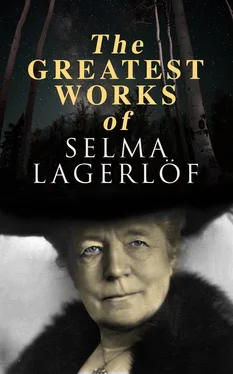When the geese flew over a place where they saw any tame, half-naked fowl, they shouted: "What's the name of this place? What's the name of this place?" Then the roosters cocked their heads and answered: "Its name's Lillgarde this year—the same as last year."
Most of the cottages were probably named after their owners—which is the custom in Skåne. But instead of saying this is "Per Matssons," or "Ola Bossons," the roosters hit upon the kind of names which, to their way of thinking, were more appropriate. Those who lived on small farms, and belonged to poor cottagers, cried: "This place is called Grainscarce." And those who belonged to the poorest hut-dwellers screamed: "The name of this place is Little-to-eat, Little-to-eat, Little-to-eat."
The big, well-cared-for farms got high-sounding names from the roosters—such as Luckymeadows, Eggberga and Moneyville.
But the roosters on the great landed estates were too high and mighty to condescend to anything like jesting. One of them crowed and called out with such gusto that it sounded as if he wanted to be heard clear up to the sun: "This is Herr Dybeck's estate; the same this year as last year; this year as last year."
A little further on strutted one rooster who crowed: "This is Swanholm, surely all the world knows that!"
The boy observed that the geese did not fly straight forward; but zigzagged hither and thither over the whole South country, just as though they were glad to be in Skåne again and wanted to pay their respects to every separate place.
They came to one place where there were a number of big, clumsy-looking buildings with great, tall chimneys, and all around these were a lot of smaller houses. "This is Jordberga Sugar Refinery," cried the roosters. The boy shuddered as he sat there on the goose's back. He ought to have recognised this place, for it was not very far from his home.
Here he had worked the year before as a watch boy; but, to be sure, nothing was exactly like itself when one saw it like that—from up above.
And think! Just think! Osa the goose girl and little Mats, who were his comrades last year! Indeed the boy would have been glad to know if they still were anywhere about here. Fancy what they would have said, had they suspected that he was flying over their heads!
Soon Jordberga was lost to sight, and they travelled towards Svedala and Skaber Lake and back again over Görringe Cloister and Häckeberga. The boy saw more of Skåne in this one day than he had ever seen before—in all the years that he had lived.
Whenever the wild geese happened across any tame geese, they had the best fun! They flew forward very slowly and called down: "We're off to the hills. Are you coming along? Are you coming along?"
But the tame geese answered: "It's still winter in this country. You're out too soon. Fly back! Fly back!"
The wild geese lowered themselves that they might be heard a little better, and called: "Come along! We'll teach you how to fly and swim."
Then the tame geese got mad and wouldn't answer them with a single honk.
The wild geese sank themselves still lower—until they almost touched the ground—then, quick as lightning, they raised themselves, just as if they'd been terribly frightened. "Oh, oh, oh!" they exclaimed. "Those things were not geese. They were only sheep, they were only sheep."
The ones on the ground were beside themselves with rage and shrieked:
"May you be shot, the whole lot o' you! The whole lot o' you!"
When the boy heard all this teasing he laughed. Then he remembered how badly things had gone with him, and he cried. But the next second, he was laughing again.
Never before had he ridden so fast; and to ride fast and recklessly—that he had always liked. And, of course, he had never dreamed that it could be as fresh and bracing as it was, up in the air; or that there rose from the earth such a fine scent of resin and soil. Nor had he ever dreamed what it could be like—to ride so high above the earth. It was just like flying away from sorrow and trouble and annoyances of every kind that could be thought of.
Table of Contents
EVENING
NIGHT
GOOSE-PLAY
Table of Contents
The big tame goosey-gander that had followed them up in the air, felt very proud of being permitted to travel back and forth over the South country with the wild geese, and crack jokes with the tame birds. But in spite of his keen delight, he began to tire as the afternoon wore on. He tried to take deeper breaths and quicker wing-strokes, but even so he remained several goose-lengths behind the others.
When the wild geese who flew last, noticed that the tame one couldn't keep up with them, they began to call to the goose who rode in the centre of the angle and led the procession: "Akka from Kebnekaise! Akka from Kebnekaise!" "What do you want of me?" asked the leader. "The white one will be left behind; the white one will be left behind." "Tell him it's easier to fly fast than slow!" called the leader, and raced on as before.
The goosey-gander certainly tried to follow the advice, and increase his speed; but then he became so exhausted that he sank away down to the drooping willows that bordered the fields and meadows.
"Akka, Akka, Akka from Kebnekaise!" cried those who flew last and saw what a hard time he was having. "What do you want now?" asked the leader—and she sounded awfully angry. "The white one sinks to the earth; the white one sinks to the earth." "Tell him it's easier to fly high than low!" shouted the leader, and she didn't slow up the least little bit, but raced on as before.
The goosey-gander tried also to follow this advice; but when he wanted to raise himself, he became so winded that he almost burst his breast.
"Akka, Akka!" again cried those who flew last. "Can't you let me fly in peace?" asked the leader, and she sounded even madder than before.
"The white one is ready to collapse." "Tell him that he who has not the strength to fly with the flock, can go back home!" cried the leader. She certainly had no idea of decreasing her speed—but raced on as before.
"Oh! is that the way the wind blows," thought the goosey-gander. He understood at once that the wild geese had never intended to take him along up to Lapland. They had only lured him away from home in sport.
He felt thoroughly exasperated. To think that his strength should fail him now, so he wouldn't be able to show these tramps that even a tame goose was good for something! But the most provoking thing of all was that he had fallen in with Akka from Kebnekaise. Tame goose that he was, he had heard about a leader goose, named Akka, who was more than a hundred years old. She had such a big name that the best wild geese in the world followed her. But no one had such a contempt for tame geese as Akka and her flock, and gladly would he have shown them that he was their equal.
He flew slowly behind the rest, while he deliberated whether he should turn back or continue. Finally, the little creature that he carried on his back said: "Dear Morten Goosey-gander, you know well enough that it is simply impossible for you, who have never flown, to go with the wild geese all the way up to Lapland. Won't you turn back before you kill yourself?"
But the farmer's lad was about the worst thing the goosey-gander knew anything about, and as soon as it dawned on him that this puny creature actually believed that he couldn't make the trip, he decided to stick it out. "If you say another word about this, I'll drop you into the first ditch we ride over!" said he, and at the same time his fury gave him so much strength that he began to fly almost as well as any of the others.
It isn't likely that he could have kept this pace up very long, neither was it necessary; for, just then, the sun sank quickly; and at sunset the geese flew down, and before the boy and the goosey-gander knew what had happened, they stood on the shores of Vomb Lake.
Читать дальше












